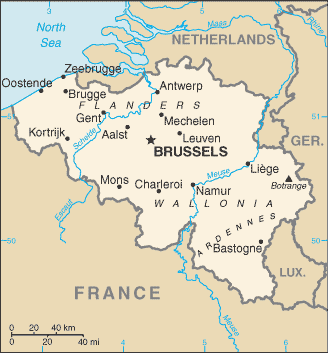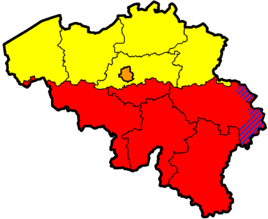Welcome to the Virtual Education Wiki ~ Open Education Wiki
Belgium: Difference between revisions
NikkiCortoos (talk | contribs) |
NikkiCortoos (talk | contribs) m (→Country in a nutshell: added information from Wikipedia.) |
||
| Line 7: | Line 7: | ||
== Country in a nutshell == | == Country in a nutshell == | ||
[[Image:Belgium_map.gif|frame|left|Source: Original gif on: [https://www.cia.gov/library/publications/the-world-factbook/geos/be.html the CIA's "The World Factbook" / Belgium]]] | |||
The Kingdom of Belgium is a country in northwest [[Europe]]. It is a founding member of the [[European Union]] and hosts its headquarters, as well as those of other major international organizations, including NATO. Belgium covers an area of 30,528 km2 (11,787 square miles) and has a population of about 10.5 million. | |||
The citizens of Belgium are called Belgians. Straddling the cultural boundary between Germanic and Latin Europe, Belgium is home for two main linguistic groups, the Dutch speakers/Flemings and the French speakers, mostly Walloons, plus a small group of German speakers. | |||
Belgium's two largest regions are the Dutch-speaking region of [[Flanders]] in the north, with 59% of the population, and the French-speaking southern region of [[Wallonia]], inhabited by 31%. The Brussels-Capital Region, officially bilingual, is a mostly French-speaking enclave within the Flemish Region and near the Walloon Region, and has 10% of the population. A small German-speaking Community exists in eastern Wallonia. Belgium's linguistic diversity and related political and cultural conflicts are reflected in the political history and a complex system of government. | |||
'''History''' | |||
The name 'Belgium' is derived from Gallia Belgica, a Roman province in the northernmost part of Gaul that was inhabited by the Belgae, a mix of Celtic and Germanic peoples. Historically, Belgium, [[the Netherlands]] and [[Luxembourg]] were known as the Low Countries, which used to cover a somewhat larger area than the current Benelux group of states. From the end of the Middle Ages until the 17th century, it was a prosperous centre of commerce and culture. From the 16th century until the Belgian revolution in 1830, many battles between European powers were fought in the area of Belgium, causing it to be dubbed "the battlefield of Europe" and "the cockpit of Europe" - a reputation strengthened by both World Wars. Upon its independence, Belgium eagerly participated in the Industrial Revolution. Its King privately possessed the [http://en.wikipedia.org/wiki/Congo_Free_State "Congo Free State"] in [[Southern Africa]] until it was later annexed by the Kingdom of Belgium as [http://en.wikipedia.org/wiki/Belgian_Congo the Belgian Congo]" until it became independent as the [http://en.wikipedia.org/wiki/Democratic_Republic_of_the_Congo Democratic Republic of the Congo]. The second half of the 20th century was marked by the rise of communal conflicts between the Flemings and the Francophones fuelled by cultural differences on the one hand and an asymmetrical economic evolution of [[Flanders]] and [[Wallonia]] on the other hand. These still-active conflicts have caused far-reaching reforms of the unitary Belgian state into a federal state. There is constant speculation by observers that this process of devolution might lead to the partition of the country. | |||
:'''Source:''' [http://en.wikipedia.org/wiki/Belgium Wikipedia's page on Belgium] | |||
Belgium is a federal state in Europe with a constitutional monarchy, founded in 1830. Its capital is Brussels and it has a population of 10 511 382 people in a total area of 30 528 km². Belgium is a double federation of: | Belgium is a federal state in Europe with a constitutional monarchy, founded in 1830. Its capital is Brussels and it has a population of 10 511 382 people in a total area of 30 528 km². Belgium is a double federation of: | ||
[[Image:268px-Belgium_provinces_regions_striped.png|frame|right|Source: Original png on: http://en.wikipedia.org/wiki/Image:Belgium_provinces_regions_striped.png]] | [[Image:268px-Belgium_provinces_regions_striped.png|frame|right|Source: Original png on: http://en.wikipedia.org/wiki/Image:Belgium_provinces_regions_striped.png]] | ||
Revision as of 15:45, 14 January 2009
Partners situated in Belgium:
- AVNet - K.U.Leuven
- EuroPACE
- Audiovisual Technologies, Informatics and Telecommunications bvba (ATiT)
Note: One of the universities in Belgium is K.U.Leuven.
Country in a nutshell

The Kingdom of Belgium is a country in northwest Europe. It is a founding member of the European Union and hosts its headquarters, as well as those of other major international organizations, including NATO. Belgium covers an area of 30,528 km2 (11,787 square miles) and has a population of about 10.5 million.
The citizens of Belgium are called Belgians. Straddling the cultural boundary between Germanic and Latin Europe, Belgium is home for two main linguistic groups, the Dutch speakers/Flemings and the French speakers, mostly Walloons, plus a small group of German speakers.
Belgium's two largest regions are the Dutch-speaking region of Flanders in the north, with 59% of the population, and the French-speaking southern region of Wallonia, inhabited by 31%. The Brussels-Capital Region, officially bilingual, is a mostly French-speaking enclave within the Flemish Region and near the Walloon Region, and has 10% of the population. A small German-speaking Community exists in eastern Wallonia. Belgium's linguistic diversity and related political and cultural conflicts are reflected in the political history and a complex system of government.
History
The name 'Belgium' is derived from Gallia Belgica, a Roman province in the northernmost part of Gaul that was inhabited by the Belgae, a mix of Celtic and Germanic peoples. Historically, Belgium, the Netherlands and Luxembourg were known as the Low Countries, which used to cover a somewhat larger area than the current Benelux group of states. From the end of the Middle Ages until the 17th century, it was a prosperous centre of commerce and culture. From the 16th century until the Belgian revolution in 1830, many battles between European powers were fought in the area of Belgium, causing it to be dubbed "the battlefield of Europe" and "the cockpit of Europe" - a reputation strengthened by both World Wars. Upon its independence, Belgium eagerly participated in the Industrial Revolution. Its King privately possessed the "Congo Free State" in Southern Africa until it was later annexed by the Kingdom of Belgium as the Belgian Congo" until it became independent as the Democratic Republic of the Congo. The second half of the 20th century was marked by the rise of communal conflicts between the Flemings and the Francophones fuelled by cultural differences on the one hand and an asymmetrical economic evolution of Flanders and Wallonia on the other hand. These still-active conflicts have caused far-reaching reforms of the unitary Belgian state into a federal state. There is constant speculation by observers that this process of devolution might lead to the partition of the country.
- Source: Wikipedia's page on Belgium
Belgium is a federal state in Europe with a constitutional monarchy, founded in 1830. Its capital is Brussels and it has a population of 10 511 382 people in a total area of 30 528 km². Belgium is a double federation of:

- 3 Communities which are responsible for the person-related issues such as education, welfare, public health and culture:
- the Dutch-speaking Community / Vlaamse Gemeenschap: Government, Ministry and Parliamant
- the French-speaking Community / Communauté Française: Government, Ministry and Parliamant
- the German-speaking Community / Deutschsprachige Gemeinschaft: Ministry and Parliament
- 3 Regions which are responsible for the territorial issues such as economy, infrastructure, agriculture, environment and employment
- the Flemish Region
- the Walloon Region
- the Brussels-Capital Region (officially bilingual)
- There are four language areas:
- the Dutch area: the provinces in Flanders: Antwerp, Limburg, Flemish Brabant, West Flanders, East Flanders
- the French area: the provinces in Wallonia: Hainaut, Walloon Brabant, Namur, Luxembourg, Liège
- the German area: the 9 municipalities of the “East Cantons” / Eupen-Malmedy
- the bilingual area in Brussels-Capital with 19 municipalities
Country education policy
The Belgian Constitution stipulates that everyone has the right to education and therefore established compulsory education. Belgium also provides that access to education is free of charge up to the end of secondary education.
As a result of the constitutional reform in Belgium the Dutch speaking and the French-speaking higher education systems were separated.
Two groups organise the educational structure: the public sector (the communes, provinces and communities) and the private sector. In the public sector there are 3 educational networks:
- community schools (neutral on religious, philosophical or ideological convictions)
- subsidised publicly run schools (organized by communes and provinces)
- subsidised privately run schools: denominational schools and schools which are not affiliated to a particular religion: the Freinet schools, Montessori schools or Steiner schools, which adopt particular educational methods and are also known as ‘method schools’.
Education that is organised for and by the government (community education and municipal and provincial education) is known as publicly run education. Recognised education organised on private initiative is called privately run education.
Because the educational system differs in Flanders and Wallonia, we decided to create two different pages, one for Flanders and one for Wallonia.
References
Belgium:
- Wikipedia on Belgium
- Wikipage on the communities, regions and language areas of Belgium
- Information about Higher Education on Belgium.be
- Wikipedia’s page on Belgium Universities and Colleges
Flanders:
- The web site for the ministry of Education and Formation
- “EDUCATION IN FLANDERS - The Flemish educational landscape in a nutshell”, PDF
- Higher Education in Flanders Register
- Study in Flanders
- Introduction to (initial) accreditation (EN)
- Accreditation (EN)
- Accredidation Framework for Flanders (EN)
- Automatic recognition of qualifications (EN)
- Joint declaration automatic recognition qualifications December 2005 (PDF) (EN)
Other:
- For corporate e-learning there's the Belgian network for Open & Distance learning (BE-ODL)
- Interesting country reports concerning e-learning: State of the art of e-learning in Belgium